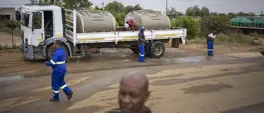Villagers throw rubbish in rivers as municipality battles waste crisis
Thembi Siaga, GroundUp
22 May 2025 | 8:13Families in villages often dig pits to bury and later burn their waste.
Families in rural parts of Makhado Municipality in Limpopo are burning rubbish in pits or throwing it into rivers because they do not have access to refuse removal services.
Makhado Municipality includes four towns — Louis Trichardt, Vleifontein, Waterval and Dzanani — and more than 200 villages. According to the 2022 Census, it has 140,338 households. According to the 2024/25–2026/27 Draft Integrated Development Plan (IDP), nearly 69% of rural households rely on their own refuse dumps, while more than 12,500 households have no rubbish dump at all.
Families in villages often dig pits to bury and later burn their waste. Others dispose of refuse — including nappies and plastic — in nearby rivers and streams. Villagers fear this could pollute the water and lead to outbreaks of infectious diseases. They are also concerned that the burning waste releases toxic fumes and pollutants into the air.
In Chavani, municipal trucks only collect rubbish along the main tarred road, bypassing homes.
Rose Maluleke, who runs a salon near Elim Shopping Complex, said the problem was affecting local businesses. “Municipal workers just burn the rubbish instead of removing it. It comes from nearby shops and the smell makes it hard to work,” she said. “We’re asking the municipality to provide large dustbins.”
Desire Matjia from Madabani village said walking to the area’s only dustbin, more than two kilometres away, was not feasible. “We dig pits in our yards and burn the waste when they fill up because of the smell,” she said.
Harry Netshia, headman of Vari village, said they had repeatedly been promised bins, but nothing had materialised. “The municipal truck has never come to our village. Most of us either burn rubbish in pits or dump it in streams. Disposable nappies are the worst. There’s just no support from the municipality,” he said.
Municipal spokesperson Mpho Rathando said efforts were underway to expand collection routes and promote responsible practices. He said the municipality was exploring partnerships to improve waste infrastructure.
To curb illegal dumping, Rathando said the municipality was increasing law enforcement and running awareness and cleanup campaigns. “All reported illegal dumping sites are cleared within 48 hours.” Waste collection points were also being established.
He confirmed that 12,500 households still lack formal refuse collection. “Each year, skip bins are placed in rural villages. Waste is collected weekly,” said Rathando.
This article first appeared on GroundUp. Read the original, co-published with The Mirror here.
Get the whole picture 💡
Take a look at the topic timeline for all related articles.















